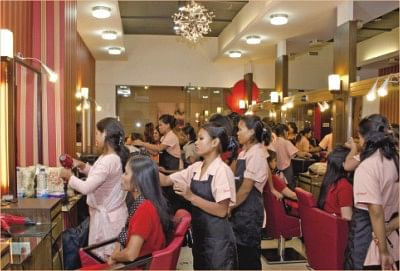Beauty--much more than skin deep

The beauty industry, once shrouded in obscurity, nowadays draws talents in great numbers. Photo Courtesy: Persona
The beauty salon sector in Bangladesh is booming, says Tahia, assistant manager of a renowned salon for the last six years. Smartly turned out in a bright suit, she is a picture of confidence as she talks about the prospects for beauticians and the trade in Bangladesh.
The beauty industry, once shrouded in obscurity, now draws talents in great numbers as an increasingly attractive career choice. In Tahia's view, there has been a radical shift in the popular perception of Bangladeshi women towards beauty and health, creating enormous opportunities for employment. What was once the domain of the affluent social groups has now permeated to the middle and even lower income groups who have become regular clients of salons.
One demographic group that seems to have taken a leading role in this sector consists of individuals from the indigenous community. Accepting this statement, Tahia suggests the reasons for such a trend.
“Firstly, we saw Garos from Mymensingh, Modhupur, Halwa Ghat, Birishiri, Netrokona come into this profession. Then Chakmas from Chittagong and Manpuris from Sylhet also made a beeline for the profession. One reason could be their aptitude for hard work that was essential during the many years it took for the industry to gain acceptance and recognition. They are also known for being highly meticulous -- another key success factor in this sector. Also, they have been in this profession for generations, so they could gradually develop their skills to match the needs of a busy and demanding metropolis,” says Tahia.
While I was looking over the long list of skincare treatments available at the salon, I struck up a conversation with Sobha from Mymensingh who typifies the beauty professional.
“When I joined the salon I hardly knew anything about the industry. I was inept and intimidated -- you are after all taking care of something that is extremely personal and important. But soon I was trained and gradually learnt the ropes of the profession. I have been working for about eight years and my work has given me confidence, self-respect and numerous opportunities. It pays well through a handsome salary and a yearly bonus -- enough to help me buy a small plot of land. I would say it has provided me security and economic freedom.”
“Beauty experts are flown in from overseas at regular intervals to groom the therapists in every way -- starting from beauty tips to client management skills. Thus begins the exciting ride in the profession,” says Kaniz Almas, managing director and founder of a leading beauty care centre.
International Women's Day is an occasion for celebration for many women in the beauty business. “We have come out of our cocoon in which we were trapped,” says Shubhra, who has been a beautician for the last eight years. However, she has a reservation: “If indeed we are on equal terms with men, then how come we have reserved seats in buses or in parliament? Where is the equality? Women are more hardworking than men and so we feel we should get our due.”
Another beautician, Korobi from Tangail, says, “It is a fulfilling profession as one brings out the latent beauty in every woman. It feels really great. I never thought I would do it professionally, but here I am. Moreover, I don't feel overworked as in many other jobs because 99 percent of the workforce is women and there is an underlying sense of mutual respect and understanding.”
Looking around at the busy team of smiling beauticians, there's little doubt that this profession has nurtured a whole new group of independent and confident working women. The women in turn have worked hard to give the profession credibility and a permanent home in the city as well as in the suburbs.

 For all latest news, follow The Daily Star's Google News channel.
For all latest news, follow The Daily Star's Google News channel. 



Comments